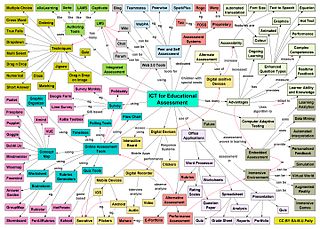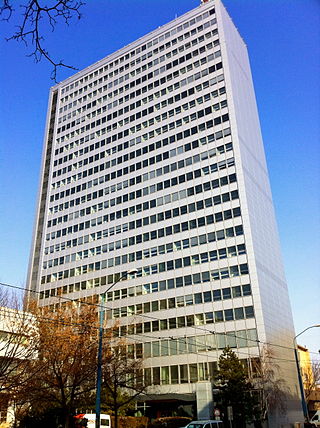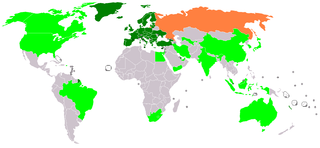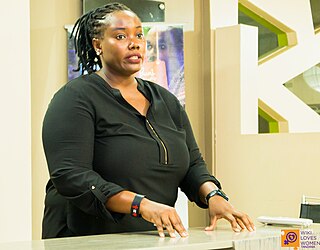
The economy of Slovakia is based upon Slovakia becoming an EU member state in 2004, and adopting the euro at the beginning of 2009. Its capital, Bratislava, is the largest financial centre in Slovakia. As of Q1 2018, the unemployment rate was 5.72%.

The Eclipse Foundation AISBL is an independent, Europe-based not-for-profit corporation that acts as a steward of the Eclipse open source software development community, with legal jurisdiction in the European Union. It is an organization supported by over 350 members, and represents the world's largest sponsored collection of Open Source projects and developers. The Foundation focuses on key services such as intellectual property (IP) management, ecosystem development, and IT infrastructure.

Information and communications technology (ICT) is an extensional term for information technology (IT) that stresses the role of unified communications and the integration of telecommunications and computers, as well as necessary enterprise software, middleware, storage and audiovisual, that enable users to access, store, transmit, understand and manipulate information.
The Department of Computer Science is a department of the Faculty of Mathematics, Physics and Informatics at the Comenius University in Bratislava, the capital of Slovakia. It is headed by Prof. RNDr. Branislav Rovan, Phd.
The International Federation for Information Processing (IFIP) is a global organisation for researchers and professionals working in the field of computing to conduct research, develop standards and promote information sharing.
The World Summit Awards (WSA) rewards Information and Communications Technologies projects that have a positive impact on society at the local level. The award was initiated in 2003, within the framework of the United Nations World Summit on the Information Society. After the UN General Assembly adopted Resolution 56/183. The awards are open to companies, organizations, or individuals from any of the UN and the UNESCO Member States. They are divided into 8 different categories. The world summit awards are managed by the International Center for New Media (ICNM), a non-profit organization based in Salzburg, Austria. ICNM was founded by Peter A. Bruck, in 2002.

Slovak University of Technology in Bratislava (STU) is the biggest and oldest university of technology in Slovakia. In the 2012 Academic Ranking of World Universities it was ranked in the first 150 in Computer Science, the only university in central Europe in the first 200. However, it lost this position in the two following years.

The Directorate-General for Communications Networks, Content and Technology is a Directorate-General of the European Commission and is responsible for EU investment in research, innovation and development of critical digital technologies.
iMinds was a Flemish non-profit organization, founded by the Flemish Government. It was founded as a research institute, with a focus on information & communication technology (ICT) in general, and applications of broadband technology in particular. iMinds offers companies and organizations active support in research and development. It brings together companies, authorities, and non-profit organizations to join forces on research projects.

A smart city is a technologically modern urban area that uses different types of electronic methods and sensors to collect specific data. Information gained from that data is used to manage assets, resources and services efficiently; in return, that data is used to improve operations across the city. This includes data collected from citizens, devices, buildings and assets that is processed and analyzed to monitor and manage traffic and transportation systems, power plants, utilities, water supply networks, waste, criminal investigations, information systems, schools, libraries, hospitals, and other community services. Smart cities are defined as smart both in the ways in which their governments harness technology as well as in how they monitor, analyze, plan, and govern the city. In smart cities, the sharing of data is not limited to the city itself but also includes businesses, citizens and other third parties that can benefit from various uses of that data. Sharing data from different systems and sectors creates opportunities for increased understanding and economic benefits.

The European Telecommunications Standards Institute (ETSI) is an independent, not-for-profit, standardization organization in the field of information and communications. ETSI supports the development and testing of global technical standards for ICT-enabled systems, applications and services.
Imrich Chlamtac was born in Zlaté Moravce, Slovakia, where in 2015, he received an Honorary Citizenship. Professor Chlamtac is the President of EAI, the European Alliance For Innovation., a private non-profit organization hosting conferences Through its international presence and being the largest European professional community in information technologies and their applications, EAI is dedicated to making information technologies a catalyst for the improvement of society, to advance worldwide research communities and help professionals build their career in an open, innovative community driven environment. As Founding President of CREATE-NET, he led the organization to international recognition as one of the leading European research organizations in communications.

Robotnik Automation S.L.L. is a Spanish company that specializes in robot product development and robotics R&D projects. Robotnik is based in Valencia (Paterna) in Spain.
Cloud-based design and manufacturing (CBDM) refers to a service-oriented networked product development model in which service consumers are able to configure products or services and reconfigure manufacturing systems through Infrastructure-as-a-Service (IaaS), Platform-as-a-Service (PaaS), Hardware-as-a-Service (HaaS), and Software-as-a-Service (SaaS). Adapted from the original cloud computing paradigm and introduced into the realm of computer-aided product development, Cloud-Based Design and Manufacturing is gaining significant momentum and attention from both academia and industry.
GLOBSEC is a non-partisan, non-governmental organisation based in Bratislava, Slovakia. One of its main activities is the annual GLOBSEC Bratislava Global Security Forum, in existence since 2005. Other projects include the Tatra Summit conference on European affairs or Chateau Béla Central European Strategic Forum. Its think-tank called GLOBSEC Policy Institute boasts a wide research area based on four pillars. Its main outputs are policy papers and analyses on different topics in the area of international politics and security issues. Since 2016, GLOBSEC is not only the name of one of the top forums on international security worldwide, but also of the legal entity and organiser of the Forum.
Time Slotted Channel Hopping or Time Synchronized Channel Hopping (TSCH) is a channel access method for shared-medium networks.

The European Centre for Electoral Support (ECES) is a not-for-profit, private, non-partisan and independent foundation with its headquarters in the capital of Belgium, Brussels.

Fernando Boavida is a Portuguese computer scientist, informatics engineer, university professor, and writer, recognized as a pioneer of network science research and internet in the University of Coimbra and in Portugal.

Rose Peter Funja is a Tanzanian software engineer and developer. She is a dean at the College of Science at the University of Bagamoyo, lecturing on ICT.











